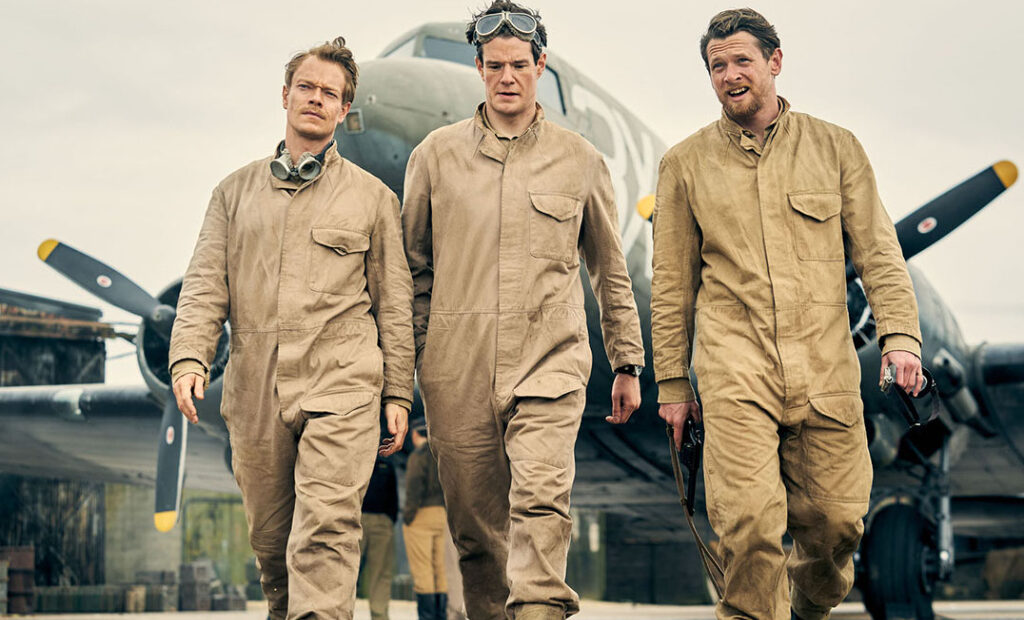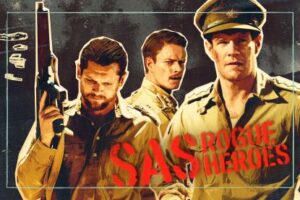“We tried to do justice to their heroism but also how they were as human beings”: Q&A with the cast and creatives on SAS Rogue Heroes

This new action-packed BBC drama, SAS Rogue Heroes, adapts the book of the same name from author Ben Macintyre into a six-part series that details the formidable rise of the fearless special forces (SAS) and charts a key moment in military history.
Written by Peaky Blinders creator Steven Knight and starring a talented cast that includes Alfie Allen and Connor Swindells, The Upcoming had the pleasure of hearing from these two cast members alongside the creative team at a Q and A held at the Curzon Bloomsbury.
Can you tell us about the story of SAS Rogue Heroes?
Steven Knight: It’s an incredible story, but when I did this research around it, what gets me is how young they were. 19, 20 and 21-year-olds put in this pressure cooker situation and they decided amongst themselves to do something different. It’s just amazing. It seems to me that soldiers obey orders mostly and don’t know they’re doing it, but the difference with the SAS is they ask why. There’s a theme between this and Peaky Blinders where it’s a group of men who are probably not the easiest men to fit into conventional society. So the heroes in this, if they hadn’t been at war, they would have ended up in jail or trouble because they weren’t equipped for normal society. There’s a great quote from Rudyard Kipling where he says: “It’s Tommy this, and Tommy that, and ‘chuck him out the brute!’ But it’s ‘saviour of his country!’ when the guns begin to shoot” and it means the people who are getting chucked out of the pubs and restaurants are the ones they need when the war starts. So the ones that don’t fit in, they become the heroes.
Can viewers expect a mix of humour and tragedy?
SK: In our conversations with members of the SAS, they said in moments of extreme danger and terror there is always this alternate emotion, which is humour. I didn’t want to make it fiction, I wanted to keep it real. So in the forthcoming episodes, there are lots of failures and disasters which there were to begin with, and as a dramatist, there are characters you’d like to keep going but they die. I chose, when that character dies, they die… and it’s a shock and hopefully viewers will be emotionally affected.
These characters have a certain ambivalence towards death, don’t they?
SK: I did some research on Stirling and I was talking to his secretary who’d worked with him for 30 years and she told me when he used to leave the office in the 1970s to go and buy cigars, he’d get to the main road, close his eyes and cross the road. He was in his early sixties and he still wanted the possibility of death.
Connor, how did you approach this role, playing a real-life person? How did you build this character up and approach this back story to him?
Connor Swindells: I didn’t want to do an impression of him, I wanted to embody the spirit of him. I suppose there’s a ridiculous entitlement that comes with thinking you have the audacity as one person to change how the military is operated at that time. It takes a certain person with a certain background to have that. He lives his life as a cowboy, then a mountaineer at some point, searching for adventure and danger as well. I have no idea the motivation for this. I am the most death-fearing person I know but I enjoyed giving myself a little break from my own neurosis. There’s a great quote – that I’ll now butcher! – from General Montgomery about David Stirling: “The boy Sterling is quite mad, quite, quite mad, however in war there’s often a place for mad people” and that was mainly plastered all over the back of my eyeballs!
Would you say he has a self-destruct button?
CS: 100% he’s got that “f*ck it” button which I think they all have. Which, when they press, chaos ensues.
Alfie, when you read about Jock, although none of them is that stable, is he the more stable of them all? How did you go about building that character?
Alfie Allen: He’s a particular type of psycho! But yes, he’s defiantly a disciplinarian, a stiff man, a more sensible, straight-laced man. But in terms of his wild side, I read a book of love letters by Jock Lewis and a book called Joy Street. I wanted to look for the inspiration for the spontaneity of that character. There’s a bit in Ben Macintyre’s book where there’s a fight going on and he stands up on the table in the mess hall and falls on a sword to take the attention away from what’s going on. I haven’t really played a character like him before.
What would you say the three of them, who are extremely different in terms of class and background, have in common?
AA: I think they all have the skill of thinking in crisis situations and Jock definitely aspires to be part of that aristocracy that David Sterling is a part of. That was something I wanted to work on in terms of his character.
Tom and Karen, it’s an incredibly stylish look, what did you set out to achieve with this project? How challenging was it with the big set pieces, the desert, the heat?
Tom Shankland: There was a strange feeling of isolation because of Covid-19 and this script felt like a documentary of the present. It was about the past, about wonderful people, but equally it felt vibrant and current. They were all young guys, and I wanted to bring to it a tone that could speak to an audience now.
Karen Wilson: It was crucial for us to get to Morocco – we needed the scale of the desert. We did a recce before Covid-19. We got real vehicles and took them out to Morocco. They shut the border in Morocco so we had to work out a way to get our team out there. Everyone that got on the plane knew they were going to be there for several weeks. The relationships that everyone built made for a tighter team; our own rogue heroes.
TS: It says everything about the spirit of everyone there – we just got on with it. We knew the real people had to deal with all of that without air-conditioned cars and with lots of people trying to bomb them.
CS: Tom did this all with a smile, despite all my complaining. He’s also the only one who didn’t get the sh*ts so I’d happily kiss his arse right now.
Was it fun running around with a machine gun? What were some of the challenges and best bits of shooting the scenes?
CW: We did a lot of day-for-night stuff which was the hardest. Nighttime in the desert is extremely cold so we’d be wearing tons and tons of layers but we’d be shooting at midday. It was unbelievably hot, holding the rifle, take after take. My fondest memory was just bombing it through the desert on Jeeps like we were living like the characters.
AA: Definitely driving the Jeeps. Food poisoning was great too! But really it was just bonding with the guys, and shooting some guns was great.
Can you tell us about the choreography of the fight scenes?
TS: We had this fantastic stunt coordinator Neil who was an ex-Para too. We talked about how we can make it real and not just hand it over to digital effects. So Neil suggested, what if we had a crane and a shipping container and we cut a hole out and then we chuck people out of the hole? Then we can have the parachutes open. We had a budget but not a Hollywood budget so it forced us all to think more creatively about how we could create enough authenticity around a moment like that.
How important was it to remember that these are real people and to do justice to that story?
KW: It’s really important. We have been in touch with the surviving members of the families. We sought the advice of the SAS regimental association who were super supportive of the process. With Ben’s book, the research Steven did, the authenticity of real World War I costumes – we’ve taken the authenticity really seriously. We respect what they did and what they did as people, we just want the audience to know about it.
SK: We tried to do justice to their heroism but also how they were as human beings. It’s a tribute to them.
Ezelle Alblas
SAS Rogue Heroes begins at 9pm on 30th October 2022 on BBC One, with all episodes then available on BBC iPlayer. Read our review of the series here.
Watch the trailer for SAS Rogue Heroes here:
























Facebook
Twitter
Instagram
YouTube
RSS